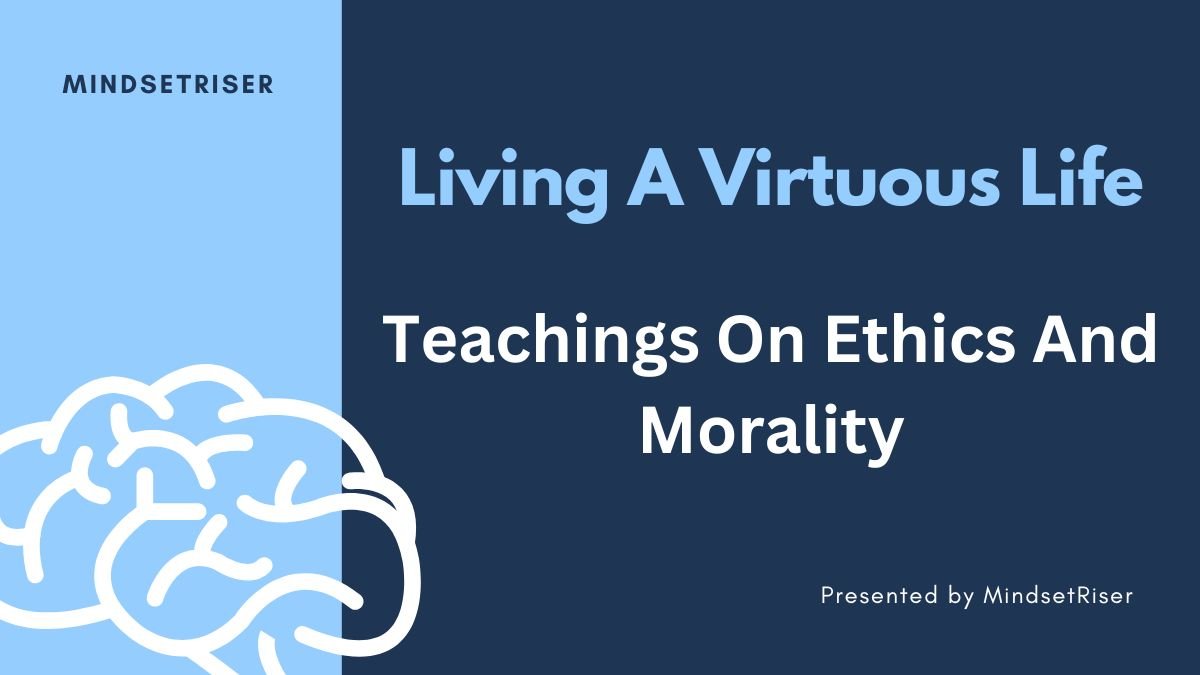Living a Virtuous Life: Philosophical Teachings on Ethics and Morality
Living a virtuous life is often regarded as the foundation of a fulfilling and meaningful existence. Throughout history, philosophers have provided various frameworks for understanding ethics and morality, each offering unique perspectives on what it means to live virtuously. In this article, we will explore key philosophical teachings on ethics and morality, examining the concept of virtue and how these ancient principles can guide modern living.
1. What is Virtue? A Foundational Question in Ethics
At its core, virtue refers to moral excellence and the cultivation of good character traits. In philosophy, virtues are the qualities that enable individuals to lead ethical, purposeful lives. Virtue ethics focuses not on rules or consequences but on the character and intentions of the individual.
- Key Idea: Virtue is not merely about following moral rules; it is about cultivating good habits, moral dispositions, and an overall sense of moral integrity. Living virtuously involves consistently choosing actions that reflect moral excellence and contribute to the greater good.
- Practical Application: To live virtuously, one must practice virtues such as honesty, kindness, and courage. These are not innate traits but qualities that can be developed through conscious effort and self-reflection.
Reflection: Living virtuously requires ongoing self-discipline and a commitment to acting in ways that reflect one’s values. It involves both moral actions and the cultivation of a virtuous character.
2. Aristotle’s Virtue Ethics: The Golden Mean
Aristotle is one of the most influential figures in the development of virtue ethics. In his work Nicomachean Ethics, he proposes the idea of the “Golden Mean,” suggesting that virtue lies between excess and deficiency. According to Aristotle, living a virtuous life means finding balance in all things, avoiding extremes, and striving for moderation.
- Key Idea: For Aristotle, virtues are the result of living in accordance with reason and achieving balance. For example, courage lies between the extremes of recklessness (excess) and cowardice (deficiency). Generosity lies between prodigality (excessive generosity) and stinginess (insufficient generosity).
- Practical Application: Aristotle’s Golden Mean can be applied to various aspects of life. When facing a difficult decision, consider where the middle ground lies and aim to choose actions that reflect moderation. This approach encourages balanced decision-making and avoids the pitfalls of extremism.
Reflection: The pursuit of the Golden Mean teaches that virtue lies in moderation. By finding balance, we avoid harmful extremes and live a more harmonious life.
3. Immanuel Kant’s Duty-Based Ethics: Acting from Moral Principles
Immanuel Kant, a German philosopher of the 18th century, developed a deontological (duty-based) approach to ethics. Kant’s philosophy emphasizes that morality is grounded in rationality and universal principles, rather than in the consequences of actions. He argues that individuals should act according to duties and respect moral laws, regardless of the outcomes.
- Key Idea: Kant’s famous “Categorical Imperative” suggests that individuals should act only according to maxims that can be universally applied. In other words, before taking an action, ask yourself: “Would it be acceptable if everyone acted this way?” If the answer is no, the action is immoral.
- Practical Application: To live virtuously according to Kant, individuals must prioritize duty and moral principles over personal desires. This involves following ethical rules and doing what is right, even when it is inconvenient or challenging.
Reflection: Kantian ethics stresses the importance of acting from a place of moral duty. By adhering to universal moral principles, we ensure that our actions reflect integrity and respect for others.
4. Confucianism: Virtue Through Social Harmony and Relationships
Confucianism, a philosophical system originating in China, emphasizes the importance of moral character and virtuous relationships in creating a harmonious society. Confucius taught that virtue is cultivated through social interactions, respect for authority, and the practice of filial piety.
- Key Idea: In Confucian ethics, virtue is closely tied to one’s role in society. The cultivation of virtues like respect, honesty, and kindness is essential for maintaining harmonious relationships within families and communities. Confucius also placed great emphasis on “Ren” (humaneness), which refers to benevolence and compassion toward others.
- Practical Application: To live virtuously, one must act with respect toward elders, practice kindness in relationships, and be committed to improving oneself for the benefit of society. For example, a person can demonstrate virtue by showing compassion toward others and maintaining integrity in social interactions.
Reflection: Confucianism teaches that virtue is not only about individual character but also about cultivating harmonious relationships. By promoting social harmony and fulfilling our roles within society, we live virtuously.
5. Utilitarianism: The Greatest Good for the Greatest Number
Utilitarianism, a consequentialist ethical theory, posits that the right course of action is the one that maximizes overall happiness and well-being. This approach, developed by philosophers like Jeremy Bentham and John Stuart Mill, focuses on the outcomes of actions and strives to create the greatest good for the greatest number of people.
- Key Idea: Utilitarianism evaluates the morality of an action based on its consequences. The goal is to choose actions that promote the greatest amount of happiness and reduce suffering for the largest number of people.
- Practical Application: To live virtuously in a utilitarian sense, one should consider the impact of their actions on others and aim to make choices that maximize collective well-being. For example, when making a decision, think about how it will affect not only yourself but also those around you and the broader community.
Reflection: While utilitarianism focuses on the consequences of actions, it encourages us to think about the broader impact of our choices. By considering the greater good, we contribute to a virtuous society.
6. Virtue in Modern Life: Applying Ancient Teachings to Contemporary Challenges
In the modern world, we face unique challenges that often test our ability to live virtuously. From the pressures of social media to the demands of work and personal relationships, it can be difficult to stay true to our moral principles. However, the philosophical teachings on virtue remain relevant today.
- Key Idea: Virtue in modern life requires continuous self-reflection and mindfulness. By practicing the virtues outlined by Aristotle, Kant, Confucius, and other philosophers, we can navigate modern challenges with a sense of purpose and ethical clarity.
- Practical Application: In today’s fast-paced world, it is essential to pause and reflect on our actions. For example, we can cultivate virtues like empathy, fairness, and patience in our interactions with others, especially in stressful or difficult situations. Practicing mindfulness and self-discipline helps us stay aligned with our values.
Reflection: In the modern age, the practice of virtue offers a way to live intentionally and ethically. By applying timeless philosophical teachings, we can create a more fulfilling and purposeful life.
Conclusion: The Ongoing Journey of Living Virtuously
Living a virtuous life is not a one-time achievement but an ongoing journey. By exploring various philosophical teachings on ethics and morality, we gain valuable insights into how to cultivate virtue and lead a meaningful life. Whether drawing from Aristotle’s Golden Mean, Kant’s duty-based ethics, Confucius’ teachings on social harmony, or utilitarian principles, we find that virtue is the key to living with integrity and purpose.
Ultimately, the practice of virtue is about aligning our actions with our deepest values, fostering personal growth, and contributing to the well-being of others. By embracing these philosophical teachings and integrating them into our daily lives, we can build a more virtuous, ethical, and fulfilling existence.

